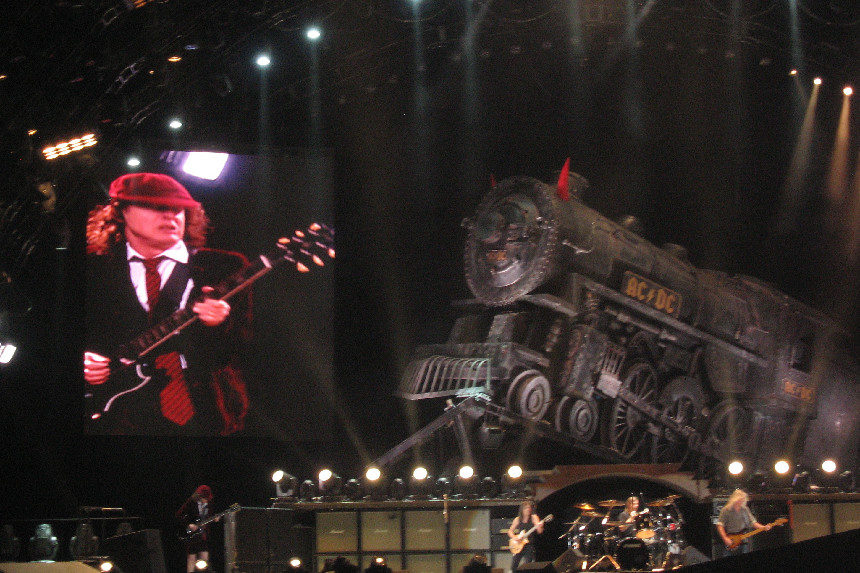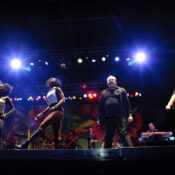Putting a band together can be an incredibly difficult proposition. The proper chemistry results in combustible creativity, explosive live performances, and a mostly stable mixture of personalities. When all of the elements successfully combine, any change can undo that balance. In that spirit, it’s extremely difficult, but not quite impossible, for a popular band to replace a lead singer for any reason. It’s been done by the likes of Genesis, Black Sabbath, and Van Halen, but it’s also failed for any number of groups. In the case of AC/DC, when lead singer Bon Scott died suddenly in 1980, they faced the daunting prospect of soldiering on with a new vocalist. Not only did the new ingredient fit, it added an accelerant that propelled the band to stratospheric success with one of the best-selling albums in history. 40 years ago this week, AC/DC came Back in Black.
Alex, George, Angus, and Malcolm Young were born in Scotland, and most of the family moved to Australia in 1963. George took up the guitar and joined The Easybeats in 1964, which would become an immensely popular band with an international hit to their credit by 1966. Alex remained in the U.K. and joined the band Grapefruit. Malcolm and Angus, both guitar players, formed their own band in Australia in 1973; from the beginning, Angus wore a costume styled like a schoolboy’s outfit on stage. Their sister Margaret suggested the name AC/DC (which stands for alternating current/direct current) after seeing it on a sewing machine.
“Highway to Hell” with Bon Scott on vocals (Uploaded to YouTube by AC/DC)
The band’s debut album, High Voltage, hit in 1975; the line-up was Malcolm and Angus, with Phil Rudd on drums, Mark Evans on bass, and Bon Scott on lead vocals. Their popularity grew quickly in Australia, and they released a second album, T.N.T., before 1975 was out. The next year, they signed with Atlantic Records for international distribution. In 1977, Mark Evans was fired and Cliff Williams joined on bass (a position he would hold until his 2016 retirement). AC/DC built their American presence through constant touring, opening for U.S. acts like Kiss, Cheap Trick, Aerosmith, and Styx. They also made albums on a steady basis, turning out six by 1979. The sixth, Highway to Hell, finally established them as a chart act in the States; with assured production by Robert John “Mutt” Lange, the record went to #17 and created an indelible anthem with the title track.
Then, disaster struck. Bon Scott died at 33, with the official cause cited as acute alcohol poisoning. The rest of AC/DC considered disbanding, but Scott’s parents urged the band to continue. Much of the next album, Back in Black, had already been written by Malcolm and Angus, and they’d be teaming again with producer Lange. When the time came to find a new vocalist, Lange suggested the former lead singer of the band Geordie, Brian Johnson. In an eerie coincidence, Scott himself had once told the rest of the band about seeing Johnson live and how much he appreciated his style. Johnson came in to audition, and was quickly offered the spot.
“Hells Bells” (Uploaded to YouTube by AC/DC)
Lange, the band, and engineer Tony Platt assembled in the Bahamas to work on the record at Compass Point Studios. With the area bombarded by storms for a few days, Johnson wrote the hurricane-laden lyrics to what would become “Hells Bells.” The band called their management to find a bell that would make the proper sound they wanted on the track; they ended up commissioning a foundry to make a bell to achieve the sound they were after. With the record done, the band went back and forth with the label over the cover. The band wanted an entirely black cover to represent mourning for Scott; they finally agreed to black cover with simple grey lettering.
“You Shook Me All Night Long” (Uploaded to YouTube by AC/DC)
Back in Black hit stores on July 25, 1980. The album was an instant international hit. It went to #1 in the U.K. and #4 in the States; it stuck around the U.S. Top Ten for five months. David Fricke from Rolling Stone praised it highly, writing that record was “not only the best of AC/DC’s six American albums . . . the apex of heavy-metal art: the first LP since Led Zeppelin II that captures all the blood, sweat and arrogance of the genre.” The song line-up included a murderer’s row of anthems. In addition to “Hells Bells” and the title track, stand-outs included “You Shook Me All Night Long,” “Rock and Roll Ain’t Noise Pollution,” and “Shoot to Thrill.” “You Shook Me All Night Long” was released as the lead single, and it cracked the Top 40 in the U.S.; to date, the song has sold over three million copies in America; the album sold a reported 25 million copies. While solid numbers remain in dispute due to different certification and ranking systems, multiple sources put the record as firmly in the Top Ten for all-time sales in the States, and behind only Michael Jackson’s Thriller for worldwide sales of a single album.
In the years since, the band has weathered the ups and downs associated with any long-running act. They’ve had tremendous successes like 1990’s The Razor’s Edge album, and the band stayed on the road as a top-selling touring act for decades. In 2003, they were inducted into the Rock and Roll Hall of Fame. The band also got an ongoing boost from the Marvel Cinematic Universe. The Iron Man 2 soundtrack in 2010 was a compilation of songs from the band, and “Shoot to Thrill” became Iron Man’s theme song across other films, recurring at a crucial moment in 2012’s The Avengers. “Back in Black” also appears in a scene in Spider-Man: Far from Home, wherein Peter Parker humorously misidentifies the band as Led Zeppelin. Unfortunately, Malcolm Young was forced to depart the band in 2014 as he battled dementia; he passed in 2017. In 2016, Brian Johnson was also forced to leave to deal with hearing problems; Guns ‘N’ Roses lead singer Axl Rose joined the band to sing lead on the group’s remaining 2016 dates. At the end of the tour, bassist Cliff Williams retired.
If rock and roll has taught us anything, it’s that no classic band will stay down forever. Rumors have swirled since 2018 that Angus was pulling together songs using guitar tracks that he and Malcolm had laid down prior to his brother’s death. By 2019, rumors had picked up that Angus would be rejoined by Johnson, Rudd, and Williams on a new album and forthcoming tour. If it’s true that one of the most popular bands of all time is about to return to rock, then we salute them.
Featured image: (Quetzalcoatl1 / Shutterstock.com)
Become a Saturday Evening Post member and enjoy unlimited access. Subscribe now




Comments
Per your last paragraph, I hope AC/DC CAN have a new life in the deadly ’20s. I liked and enjoyed AC/DC’s music when it would come on KLOS and other stations back in the day, but wouldn’t seek out buying their albums or seeing them in concert. Same with Kiss, Aerosmith or even Van Halen. A “mid-range” appeal, probably the category most singers and groups fell into.
Very few did I really hate. That though, would be Journey and the ‘Michael McDonald’ Doobie Brothers. I loved them so much in their early years of ’72-’75. From ’76 onward, it became an entirely different rhythm ‘n blues I didn’t like. Only a fool would believe they were same group at ALL. Cry-baby Journey? Never!
Foreigner was a great group I saw twice between ’77-’81. Each album was better than the one before. ‘4’ was fantastic except for the Journey-style song ‘Waiting For a Girl Like You’. Their next album was full-on ‘Journey’ and I was done with them permanently, except for the early ones I love (to this day) of course. I WILL admit going to see the Foreigner cover band various Tuesday nights when they appeared at Vitello’s in the ’10s. Does that make me a hypocrite? No. When some of the crappy (later) songs started, I’d go downstairs to check out any messages and e-mails. A number of people did, and those songs—-wound up off the playlist. or were definitely shortened. 🙂
Replacing a lead singer is tricky and risky. Even though I strongly dislike Journey, they did a great job with a perfect sound-alike singer. Genesis also did a great job on that front in the ’80s with Phil Collins. Though Sammy Hagar was/is no David Lee Roth, he was good replacement; especially in light of the Doobie Bros. debacle. Genesis was different with Phil Collins, but wonderful still. It let Peter Gabriel do some amazing work in the ’80s that wouldn’t have happened otherwise.
‘Rock’ essentially died around 30+ years ago once rap, hip-hop, computer whatever took over. It still exists in 20th century groups still around now, like AC/DC! Styx is still great with Lawrence Gowan being equivalent to Dennis DeYoung. 2019 was the 9th (or 10th?) concert. Let’s make it an 11th, and a 7th for ELO. A 6th concert with Deborah Harry/Blondie sounds great to me! LOVE that woman; still THE Marilyn Monroe of new wave rock!
I’m all for ‘cover bands’ that faithfully keep vintage groups alive, such as ‘Which One’s Pink?’ and ‘Strange Days’. I’ve seen the latter several times, and know some of the members. If the doors ever re-open on concerts again, look for them in a city near you. Highly recommend both! ‘The Long Run’ too is great for an Eagles fix. Seen them a few times. All of them the next best thing to the real thing.